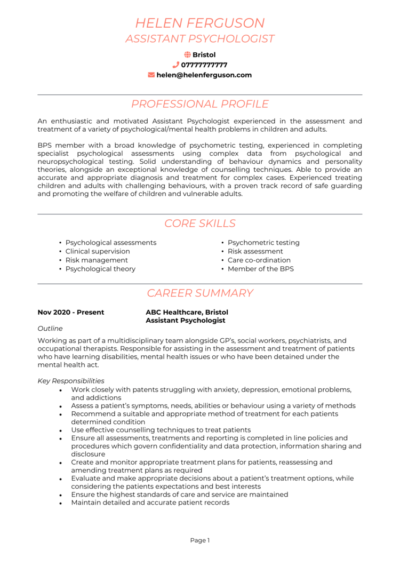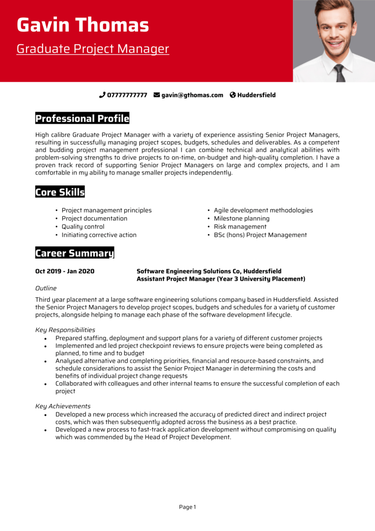You’re used to helping others communicate their thoughts and behaviours – but now it’s your turn.
As an Assistant Psychologist, your role is all about observation and support, but to land your next position, you’ll need a CV that shows hiring managers you’re more than just helpful – you’re clinically capable and professionally prepared.
This guide and its Assistant Psychologist CV example will help give your application the best chance of making an impact.
Assistant Psychologist CV
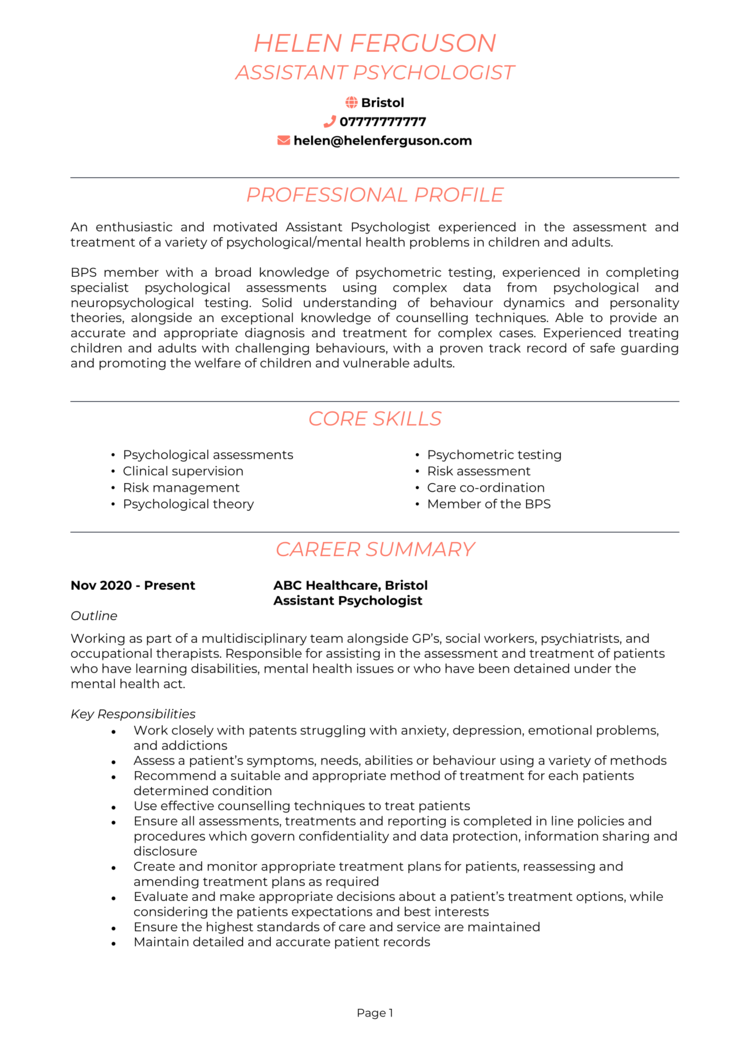
How to write your Assistant Psychologist CV
Discover how to create a quality Assistant Psychologist CV with this simple step-by-step guide.
An Assistant Psychologist CV isn’t just a list of qualifications – it’s a chance to show your readiness to support mental health professionals, work sensitively with clients, and contribute meaningfully to clinical or research settings.
This guide will help with writing a CV to organise your experience and credentials clearly, so recruiters can see your potential from the first glance. Whether you’re aiming for NHS placements, private clinics, or research posts, your CV will show that you’re already thinking like a future psychologist.
The best way to structure and format your Assistant Psychologist CV
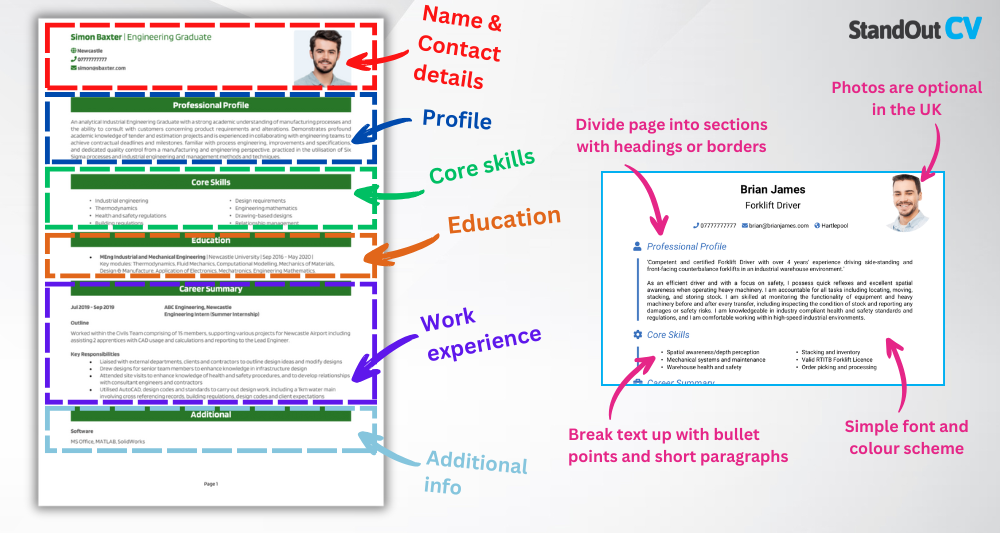
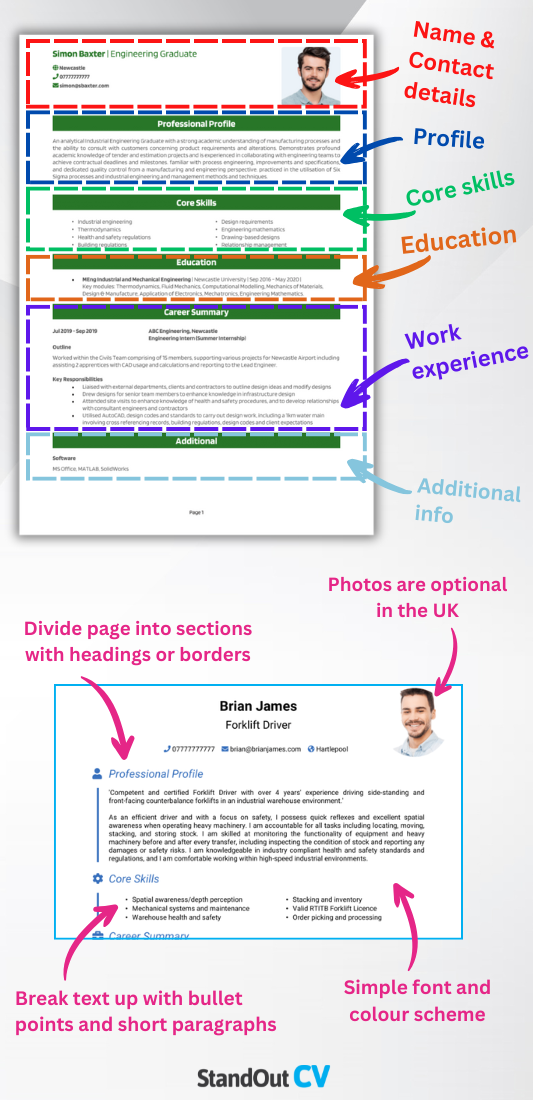
Just like a good assessment report, your CV needs to be structured, focused, and easy to interpret. Hiring managers want to quickly understand your academic training and clinical exposure – so present it in a clear and logical order which doesn’t force them to navigate through mess and mistakes.
Here’s the layout to follow:
- Name and contact details – Display your name and contact details clearly at the top; a photo is optional.
- Profile – Write a short, focused summary of your psychology experience, areas of interest, and career goals.
- Core skills – Highlight relevant skills such as data analysis, client communication, behavioural observation, or report writing.
- Work experience – Detail any clinical placements, voluntary roles, or research assistance, listed from most recent to earliest.
- Education & certifications – Include your academic background in psychology and any additional training or CPD.
- Additional info – Optionally list publications, hobbies, software proficiency (e.g. SPSS), or relevant awards.
You wouldn’t submit a report full of jargon and no formatting – so don’t send a CV like that either. Aim for a clean, professional format and keep your CV to a maximum length of two pages – save any more for the cover letter. Stick to a clean and readable font, making full use of bullet points to break down large blocks of text.
What is an Assistant Psychologist CV profile?
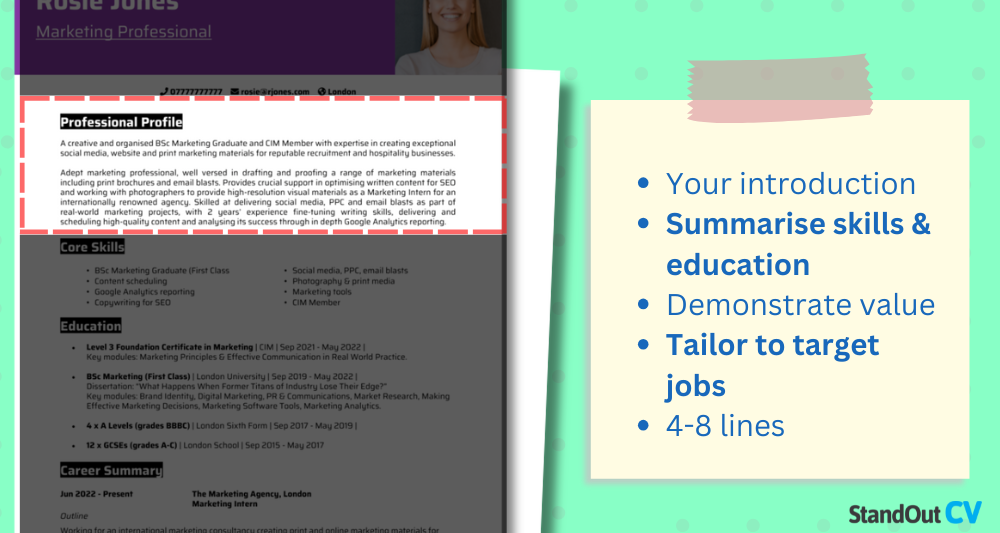
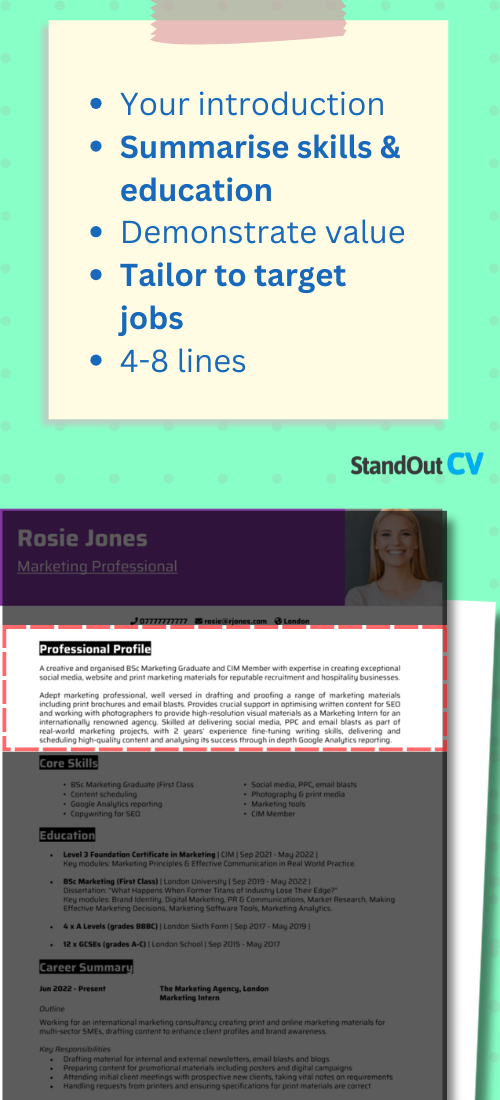
This is your chance to summarise your interest in psychology and the experience that’s prepared you for an Assistant Psychologist role. It should convey a mix of academic knowledge, hands-on involvement, and enthusiasm for progressing in the field. Tailor your CV profile precisely to the role you’re applying for, to best reassure recruiters that you’re the candidate they should trust.
Candidates with little to no experience should go for a longer personal statement, which allows for greater detail and focuses more on your ambition.
Assistant Psychologist CV profile examples
Profile 1
Compassionate and research-driven Assistant Psychologist with one year of experience supporting mental health assessments and interventions in NHS and community settings. Skilled in administering psychometric tests, conducting behavioural observations, and compiling clinical notes. Proficient in SPSS and psychological report writing. Dedicated to providing evidence-based support and working collaboratively with multidisciplinary teams.
Profile 2
Motivated Assistant Psychologist with hands-on experience gained through placements and voluntary roles in clinical and educational environments. Experienced in working with adults and young people with anxiety, depression, and developmental disorders. Strong background in cognitive assessments, data entry, and safeguarding procedures. Passionate about mental health advocacy and pursuing further training in clinical psychology.
Things to have in your Assistant Psychologist CV profile
Here’s some tips on what to include:
- Academic background – Mention your psychology degree and any postgraduate study.
- Clinical exposure – Refer to experience with mental health services, therapy sessions, or patient interactions.
- Research knowledge – Include areas of interest or past involvement in data collection or analysis.
- Career goals – Briefly mention your aspiration to progress into psychology or related fields, showing long-term commitment.
- Strengths – Highlight interpersonal skills, organisation, discretion, or an understanding of safeguarding and confidentiality.
How to highlight your core skills
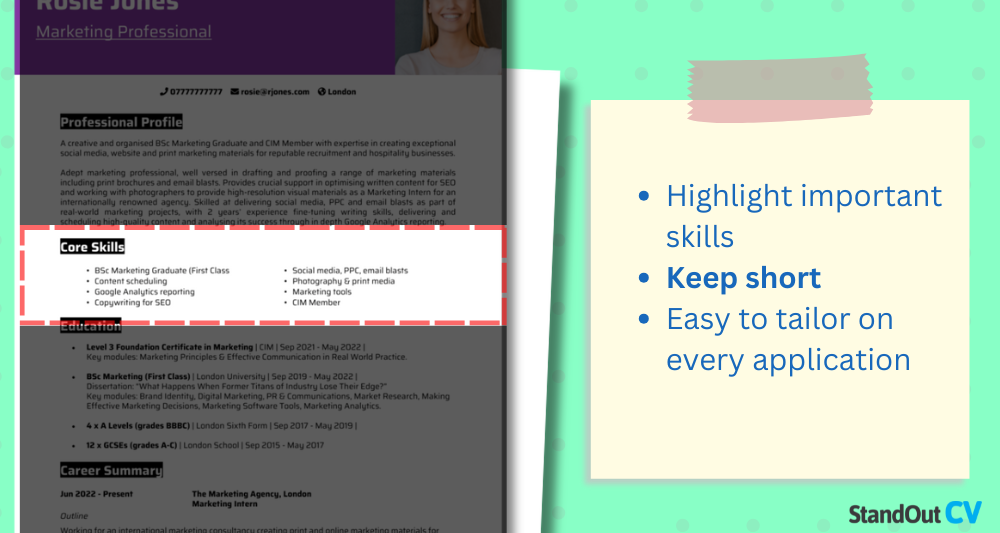
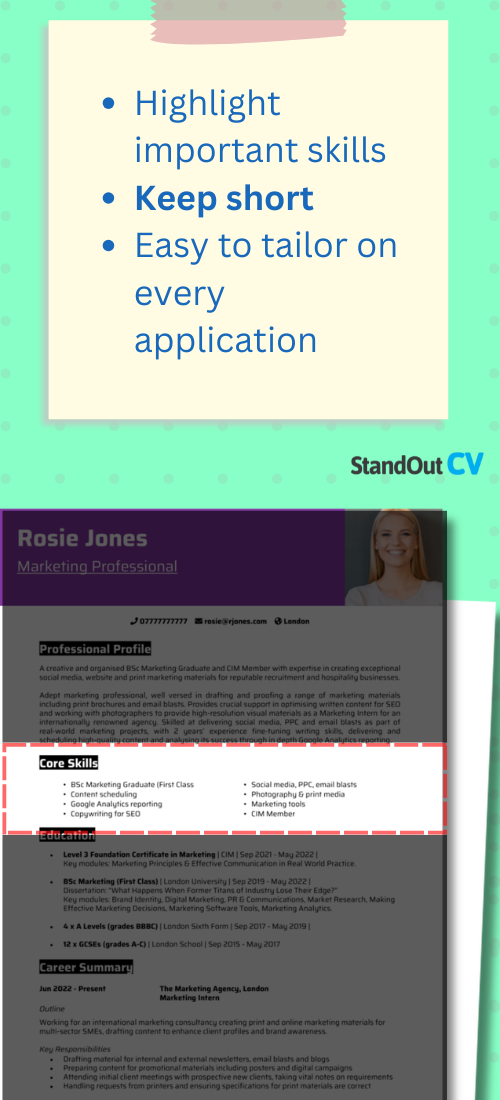
Your CV skills section should quickly reassure employers that you’re well-versed in the day-to-day demands of supporting psychological professionals. Focus on relevant, applied skills, both academic and interpersonal.
Recruiters want skills, not soft affirmations: so tailor your list to the role and avoid vague or generic abilities – keep it focused and relevant to academic or therapeutic work.
Essential skills for an Assistant Psychologist CV
- Psychological Assessment Support – Assisting in the administration and scoring of standardised psychological tests and questionnaires.
- Data Collection and Analysis – Gathering, organising, and analysing clinical and research data to support psychological interventions.
- Clinical Observation and Note-Taking – Observing therapy sessions or assessments and maintaining accurate, confidential records.
- Service User Engagement – Supporting clients under supervision, helping them feel comfortable and engaged in sessions.
- Report Writing and Documentation – Contributing to psychological reports, case notes, and summaries under guidance from qualified psychologists.
- Research and Literature Review – Conducting background research and reviewing academic literature to inform clinical work or projects.
- Behavioural Interventions – Assisting with the implementation of evidence-based interventions, such as CBT techniques or behavioural plans.
- Multidisciplinary Team Collaboration – Working alongside psychologists, psychiatrists, nurses, and other professionals in a healthcare setting.
- Safeguarding and Ethical Practice – Following professional guidelines (e.g. HCPC, BPS) and ensuring confidentiality and safeguarding procedures are upheld.
- Administrative and Organisational Support – Scheduling appointments, preparing materials, and supporting the day-to-day running of psychological services.
Structuring your education section
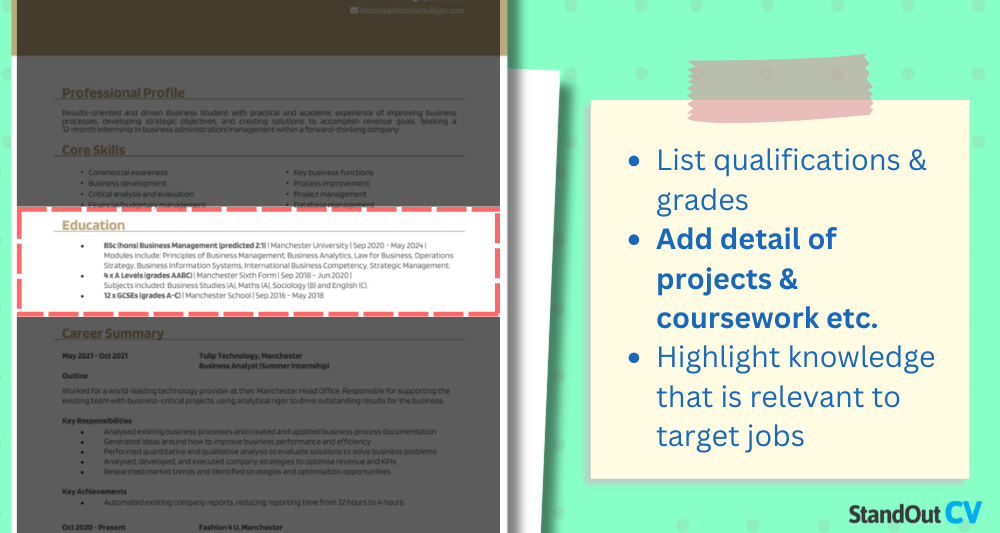
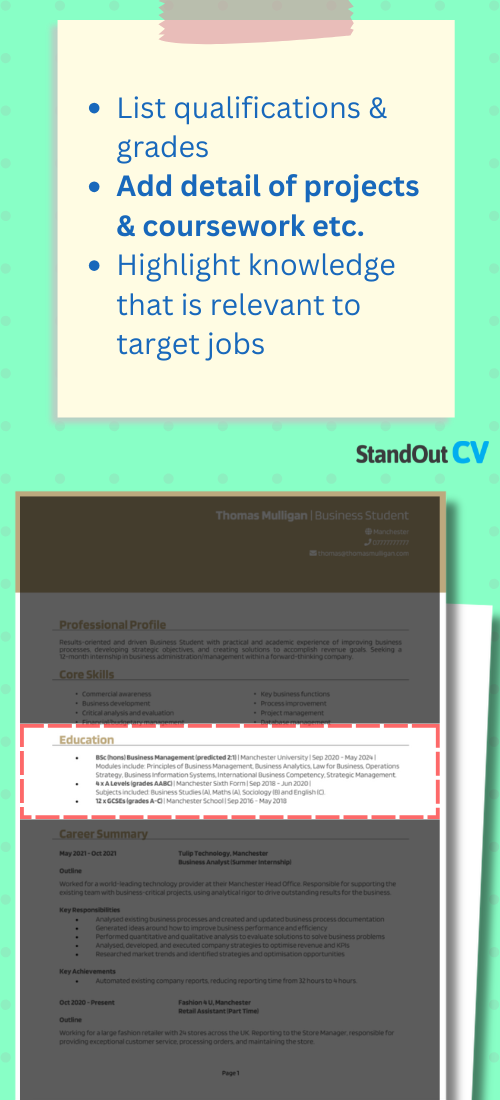
Psychology is a highly academic field, so this section will carry significant weight. Clearly present your degrees, training, and ongoing learning in reverse chronological order.
Include your psychology degree (preferably BPS-accredited), along with any relevant postgraduate study or short courses in areas like CBT, safeguarding, or research methods. If you’re working toward further qualifications, mention them too, and expand on any relevant modules which have especially instilled important skills.
Example education sections
Education 1
Distinction MSc Clinical Psychology | University of Sussex | 2022–2023
Modules included Psychological Assessment, Neuropsychology, and Cognitive Behavioural Therapy. Completed a research thesis on early intervention strategies for anxiety in adolescents. Volunteered as a research assistant for a study on mindfulness-based interventions in school-aged children.
First Class BSc (Hons) Psychology | University of Leicester | 2019–2022
Modules included Developmental Psychology, Statistics for Psychology, and Health Psychology. Undertook a dissertation on the relationship between social media use and body image in young adults.
3x A-Levels (A–B) | Larchfield Sixth Form College | 2017–2019
10x GCSEs (A*–C) | Thornhill High School | 2015–2017
Education 2
Merit MSc Health Psychology | University of Bath | 2021–2022
Modules included Behaviour Change Interventions, Long-Term Conditions, and Advanced Research Methods. Completed a supervised research project on improving patient adherence in chronic pain management. Presented findings at the university’s postgraduate conference.
Upper Second Class BSc (Hons) Psychology with Counselling | University of Chester | 2018–2021
Modules included Counselling Skills, Abnormal Psychology, and Research Design. Completed a final-year dissertation on the effectiveness of CBT techniques in supporting university students with generalised anxiety.
BTEC Level 3 Extended Diploma in Health & Social Care (D*D*D) | Westbrook College | 2016–2018
9x GCSEs (A*–C) | Ridgeway School | 2014–2016
What to include in your education section
For each qualification, add the following info:
- Qualification & organisation – Say what you studied and where you completed the course.
- Dates studied – Give the start and finish dates of each certification.
- Extra details – Go into more depth on specific courses or individual modules, emphasising the skills and the experience you gained which equip you for the jobs you’re applying for.
Top qualifications to showcase on an Assistant Psychologist CV
- BSc (Hons) Psychology (BPS-accredited) – Essential for most Assistant Psychologist roles.
- MSc in Clinical, Health, or Forensic Psychology – Offers specialist knowledge and strengthens your application.
- Mental Health First Aid Training – Demonstrates readiness to support clients appropriately.
- Safeguarding Children and Adults Training – Important for roles in healthcare or educational settings.
- Introduction to CBT or other therapeutic approaches – Shows commitment to learning evidence-based practices.
How to showcase your work experience in your CV
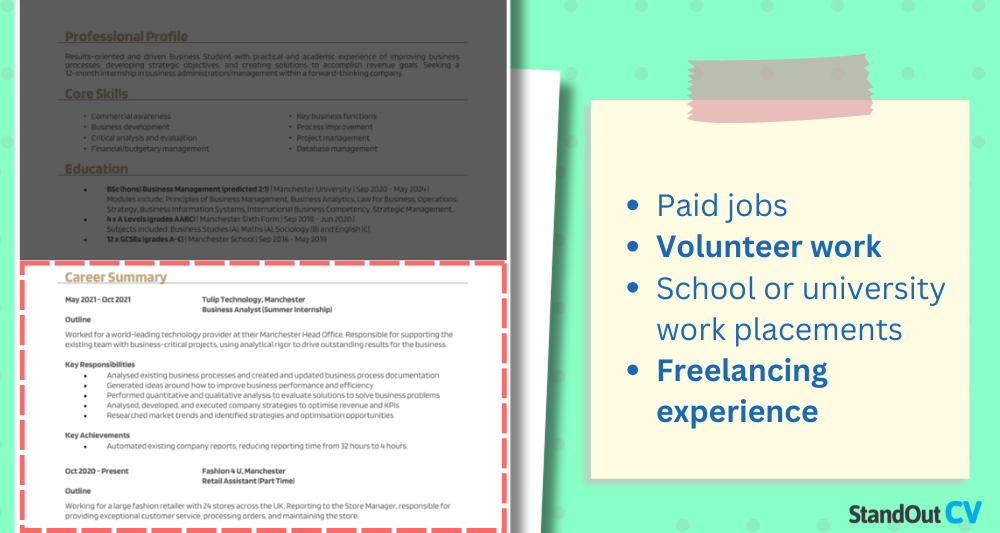
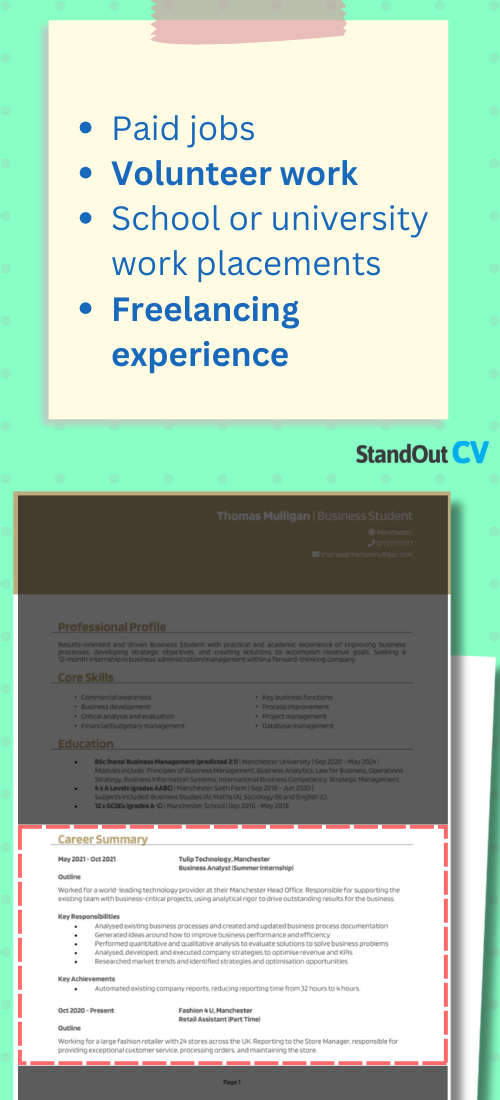
Your work experience is crucial for showing that you can put theory into practice. Whether you’ve completed an NHS placement, supported a clinical study, or volunteered with vulnerable groups, use this space to show your exposure to real-world psychological settings.
Show that you can do more than observe – demonstrate your ability to work with clients and contribute to team outcomes, starting with your most recent or relevant experience and working backward. If you lack direct psychology experience, include transferable experience from care, education, or support work.
How to format previous jobs in your CV correctly
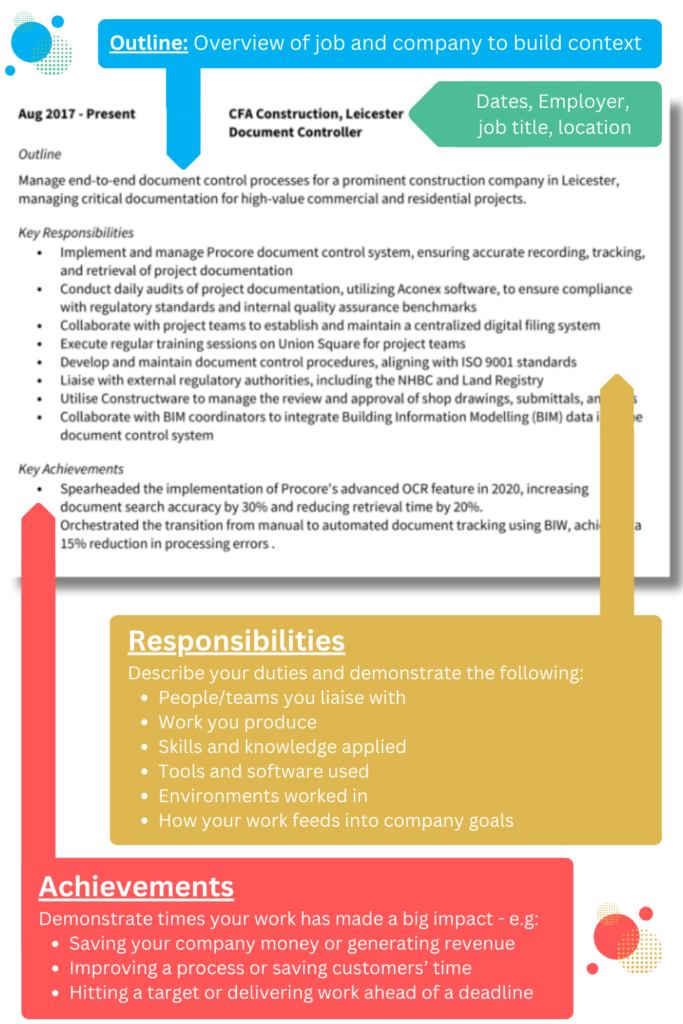
- Outline – Briefly describe the employer or organisation and your role within it.
- Responsibilities – Detail your main tasks, such as conducting observations, writing notes, or supporting interventions. Use power words like “observed,” “assisted,” and “collated.”
- Achievements – Highlight contributions to research, service improvement, or patient support. Where possible, refer to positive feedback or outcomes.
Example work history for Assistant Psychologists
Assistant Psychologist | Harrowdale NHS Trust
Outline
Provided psychological support in a community mental health team for a busy NHS trust, assisting with assessments, intervention planning, and clinical documentation.
Responsibilities
- Assisted clinical psychologists in administering standardised assessments and compiling patient histories.
- Recorded behavioural observations during therapy sessions and contributed to formulation discussions.
- Maintained accurate clinical notes in line with NHS governance and confidentiality protocols.
- Developed psychoeducational materials for patients and their families.
- Participated in MDT meetings and contributed to service evaluation projects.
Achievements
- Helped reduce assessment wait times by 15% by supporting triage and screening procedures.
- Recognised for clear and empathetic communication with service users.
- Contributed to a research audit on treatment outcomes that was presented at a regional NHS forum.
Assistant Psychologist | Lightfoot Neuropsychology Services
Outline
Supported neuropsychological assessments and rehabilitation planning for clients with acquired brain injury at a private psychology clinic.
Responsibilities
- Administered cognitive assessments under supervision, including WAIS-IV and RBANS tests.
- Scored and interpreted results for use in multidisciplinary team discussions.
- Helped design rehabilitation activities tailored to individual cognitive profiles.
- Maintained detailed records and managed assessment data using Excel and SPSS.
- Liaised with families and carers to support understanding of cognitive impairments.
Achievements
- Contributed to a new client care pathway that improved follow-up service uptake by 25%.
- Created accessible patient summaries praised by supervising psychologists.
- Supported delivery of group sessions focused on memory strategies and executive function.
Writing an additional info section for your CV
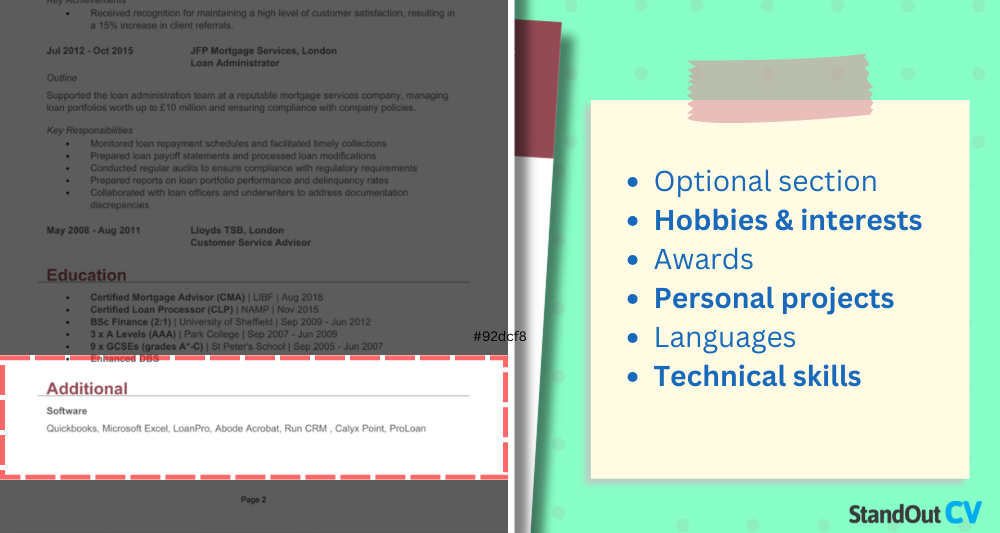
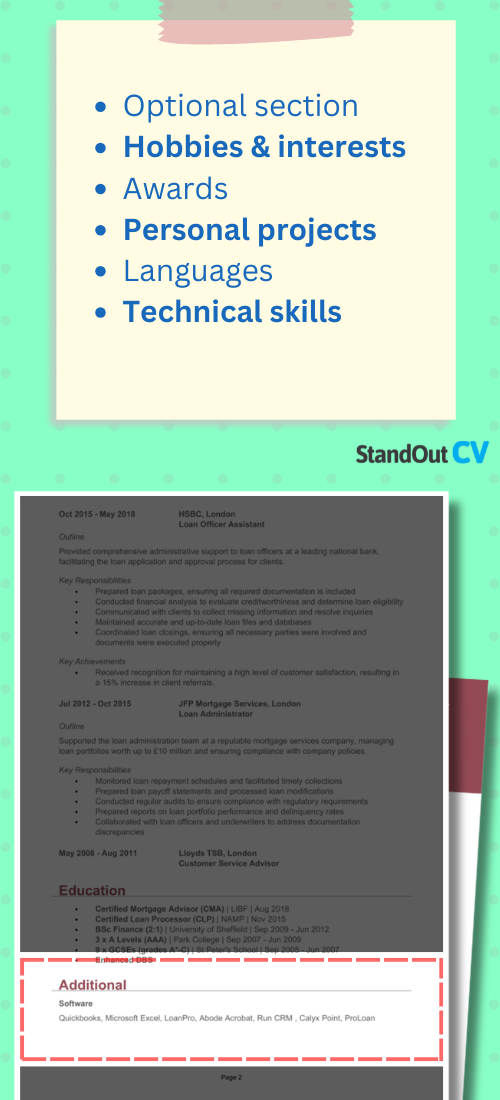
For aspiring assistant psychologists, the Additional Information section can offer insight into your interpersonal skills, emotional awareness, and genuine interest in psychological practice.
When experience is limited, this section helps you stand out by showcasing personal qualities, relevant interests, and self-initiated learning that align with clinical and research work.
Good additional info for Assistant Psychologist
- Hobbies – Activities that encourage empathy, observation, or critical thinking—such as journaling, creative arts, or mindfulness—can demonstrate your emotional insight and self-awareness.
- Awards and Achievements – Recognition for academic performance, contributions to mental health initiatives, or leadership roles shows commitment and the ability to support others.
- Extracurricular Activities – Involvement in mental health societies, peer support, or advocacy roles demonstrates initiative and practical interest in psychological wellbeing.
- Personal Projects – Independent study, psychology-related writing, or building resources to support others reflects motivation and a deeper engagement with the field.
Additional info example
Additional info
Hobbies
Journaling – Maintain a reflective journal to explore thoughts and behaviours, improving self-awareness and emotional insight.
Art and illustration – Use creative expression to explore emotions and develop alternative ways of understanding mental health.
Mindfulness – Practise regular meditation techniques to support focus, emotional regulation, and stress management.
Awards and Achievements
Research poster award – Recognised at a university showcase for presenting findings on anxiety in young adults.
Wellbeing ambassador certificate – Acknowledged for promoting positive mental health practices across campus.
Extracurricular Activities
Mental Health Society member – Helped organise workshops and discussion groups on managing stress and emotional wellbeing.
Peer support volunteer – Provided informal listening and support to students during exam periods.
Personal Projects
Mental health Instagram page – Created content promoting self-care and sharing psychological concepts in an accessible way.
Self-taught CBT principles – Independently explored cognitive behavioural therapy frameworks to better understand therapeutic models.


